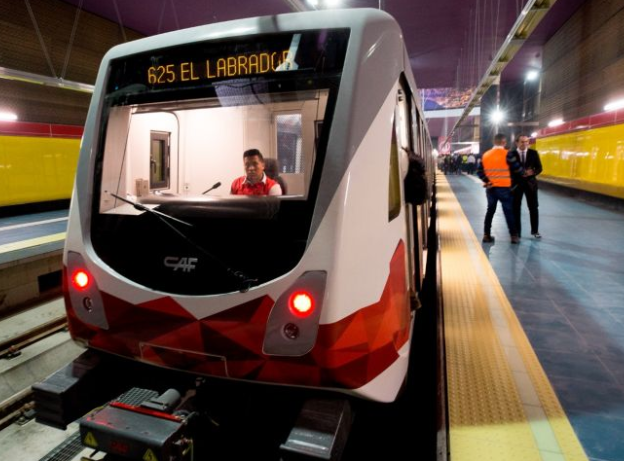Quito subway system overwhelmed in first day of commercial operation, promises quick fixes
Ecuadorians stood in long lines Tuesday to buy tickets for the first day of commercial services by Quito’s new underground railway system. The Quito Metro subway had been offering free-of-charge test rides for the past four months.

One of the cars of the Quito Metro subway system.
On the first day of commercial operations, however, the lack of ticket agents and technical failures in the pass printing system with QR codes led to numerous passenger complaints. Quito Mayor Santiago Guarderas acknowledged that “there are inconveniences that will be polished to offer, in a short time, an impeccable service to the people of Quito.”
The company said in a statement that ate Quitumbe, the first exit point from the south of Quito, the demand of users tripled the average that the Metro had been mobilizing in its test phase, which generated setbacks in the sale of tickets. “Our calculations were based on operations since the beginning of the year and obviously we miscalculated demand for the first day of commercial operation,” the Metro said in a statement.
In view of this, an apology was issued together with the promise that “the necessary corrective measures are being taken so that the following days will be carried out with agility.” As of this Tuesday, the general public must pay a fare of US$ 0.45, while a reduced fare of US$ 0.22 was established for students up to high school and senior citizens and a preferential fare of US$ 0.10 for people with disabilities.
The Quito Metro construction began in the 2010s by the Spanish company Acciona at a cost of over $2 billion. It has a fleet of 18 trains that run from north to south along 22.6 kilometers. It is one of two large mass transit projects began under the administration of former president Rafael Correa.
The second, the Cuenca tram, has been operating successfully for more than two years, with ridership increasing from 7,000 to 23,000 per day since the start of operations. According to the International Municipal Mass Transit Assocation, the Cuenca light-rail system, which cost $320 million to build, has the lowest accident rate in the world per kilometer among similar systems as well as the lowest non-payment rate, at less than 2%.
The Quito Metro network will not operate at full capacity, with reduced schedules and some stations still closed. When fully operational, this transportation system is expected to become a relief for the Ecuadorian capital, which is experiencing vehicular chaos.
The Metro will be operated during the first 6 years by a consortium formed by the French company Transdev and the Colombian Metro de Medellín.




















